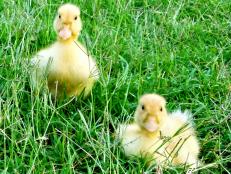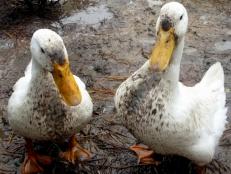How to Keep Ducks Warm in Cool Weather

Photo by Lisa Steele
Ducks are extremely cold-hardy due to a nice thick layer of body fat and soft down under their waterproof feathers. They actually need very little in order to be comfortable in cold weather, but there are a few simple things you can do to keep your ducks happier and healthier through the winter months.
Offer High-Energy Treats
All through the winter, especially right before bedtime, high-fat, high-calorie treats such as cracked corn, warm oatmeal or peanuts will help to keep your ducks warm overnight as their body works to digest them. These calorie-dense treats will also help to put on a bit of extra weight for winter which will keep the ducks warm as well. Since weeds and grass are scarce during the winter, your ducks will enjoy chard, kale or other cold-crop leafy greens to munch on. A head of cabbage will keep them busy and help prevent boredom.
Raising Ducks: A Primer on Duck Housing, Diet and Health
Learn what ducks eat, and how to ensure they are comfortable and healthy.
Provide Straw Insulation
Straw has wonderful insulating properties. A nice thick layer of chopped straw on the floor of your duck house will be appreciated. Ducks love to snuggle down into the bedding at night to keep warm. Use additional bales of straw for 'insulation' along the inner walls if you live in an extremely cold climate and have a large house for them. The straw bales take up the cold ‘dead’ space and make it easier for the ducks to warm their house using their body heat.
Lay some straw down in the run or pen as well so your ducks can get outside for some fresh air, but still get up off the snowy, cold ground. If you notice your ducks hopping from one foot to another, or holding one foot up and only standing on one foot, it's likely their feet are cold. Ducks are just fine down to temperatures around 20 degrees, but below that they can suffer frostbite on their feet which could lead to amputation. In addition to the straw, wooden planks, benches or even low stumps in their pen will help the ducks get off the frozen ground and keep their feet warm. Ducks sometimes seem to enjoy sitting right in the snow, but you might notice that they pull their feet up off the ground and tuck them into their feathers and against their bodies for warmth.
Provide a Well-Ventilated House
Ducks emit lots of moisture when they breathe as they sleep, so be sure your duck house is well-ventilated. Vents should be plentiful and positioned up high, not at floor level. Don’t be tempted to heat the duck house. Heat lamps are a fire hazard and the heat actually creates additional moisture which can lead to frostbite.
A Guide to Duck Houses
See these six things to consider when building a home for backyard ducks.
Create a Windbreak
Your ducks will enjoy being outside on sunny winter days, but they don’t seem to like being exposed to the cold winter wind. Make a wind barrier in one corner of the pen with a tarp or sheets of plywood so they can enjoy some time outdoors on all but the most blustery of days.
Provide Fresh Drinking Water
Ducks need access to water at all times during the day. A heated dog water bowl makes an inexpensive waterer that won’t freeze in the winter. Ducks don't necessarily need to swim during the winter, but they will enjoy a deep tub of water a few times a week so they can dunk their bills and heads and maybe even hop in for a quick bath.
Like any animal, your ducks will appreciate a bit of extra TLC come winter, and be far happier and healthier if you take these few steps to ensure they stay warm on those frigid, blustery days.















































